 Logic and science play crucial roles in understanding how nature works. Importantly, however, there are distinct types of logic and methods in science. Selecting the appropriate type of logic and science is crucial for developing scientifically valid explanations.
Logic and science play crucial roles in understanding how nature works. Importantly, however, there are distinct types of logic and methods in science. Selecting the appropriate type of logic and science is crucial for developing scientifically valid explanations.
Charles Darwin applied various logic and scientific methods in his life-long quest to explain how Earth’s biosphere works. The story of his quest is fascinating, giving insight into how the interplay of logic and science still influences modern evolution research.
Education
After initially beginning as a science student at Edinburgh University, Darwin transferred to Christ’s College at Cambridge University a year later. There, however, he failed to qualify to pursue further studies in science.
However, Darwin’s quest for a natural mechanism to explain the mystery of life continued. After more than three decades of searching and studying, the title of his book summarizes his explanation –
“On the Origin of Species by Means of Natural Selection”
Natural selection is Darwin’s explanation of how Earth’s vast biosphere emerged. Despite objections by the pioneers of the Scientific Revolution over his methods, his work quickly emerged as one of the most controversial concepts in Western civilization.
Polling and Consensus
A recent British poll found that only the Bible is viewed as more valuable to humanity than The Origin of Species. Darwin argued that all life forms emerged from a common ancestor through the process he called natural selection.
Yet even the world’s largest science organizations have yet to reach a scientific consensus on the role of natural selection. Evolution is the longest-running contentious theory in the history of science.
Natural Sciences
Physics, chemistry, and biology are the main branches of natural science. While the known laws of physics and chemistry are universal and predictable, until Darwin’s introduced his concept, there were no known universally predictable laws in biology.
However, the lack of a modern scientific consensus on the theory of natural selection raises the question of whether natural selection is a universal law of biology. This uncertain state of natural selection raises questions about what went wrong. Specifically, was Darwin’s investigative approach wrong?
Selecting a study approach to evolution has long been controversial, even in the nineteenth century. As outlined in the following, while Darwin began with a scientific approach, eventually the influence of Enlightenment’s logical approach prevailed.
Scientific Process
Observations that lead to questions are the first steps in the scientific process. However, experience with the process demonstrates that the method of performing these steps plays an crucial role.
The first to use the scientific process revolutionized the once widely popular understanding of how our solar system works.
Copernicus
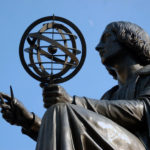 Polish astronomer Nicholas Copernicus (1473-1543) (depicted on the left) laid the foundations of modern science. With repetitive observations and inductive reasoning, Copernicus overturned Aristotle’s geocentric theory and established the first principle of science. His heliocentric model launched the Scientific Revolution.
Polish astronomer Nicholas Copernicus (1473-1543) (depicted on the left) laid the foundations of modern science. With repetitive observations and inductive reasoning, Copernicus overturned Aristotle’s geocentric theory and established the first principle of science. His heliocentric model launched the Scientific Revolution.
The Royal Society
The Royal Society of London played a critical role in launching the Scientific Revolution by formulating the methods of the scientific process. Their scientific process became known as the Scientific Method. Established in 1660 by King Charles II,
The Royal Society is the oldest continuously existing Society that advances the principles of science. Science’s most influential contributor, Isaac Newton (1642-1727), served as president of the Society for over 20 years.
Observation
 In 1839, the Society elected Darwin as a Fellow for his geological works (pictured right) during his global voyage. Darwin’s method of using measurable observations conformed to the Society’s method of objective observation.
In 1839, the Society elected Darwin as a Fellow for his geological works (pictured right) during his global voyage. Darwin’s method of using measurable observations conformed to the Society’s method of objective observation.
The Society eventually awarded Darwin the Royal Medal in 1853 for publishing his geological works and monograph of fossilized barnacles. Notably, however, neither of these works mentioned nor inferred any aspect of biological evolution.
Next in the scientific process is the method of asking questions about the observations.
Nullius in Verba
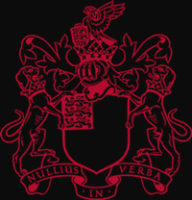 “Nullius in Verba.” is the official motto of the Society. In Latin, the motto means “Take nobody’s word for it” (illustrated left). The Society underscore its purpose with the following statement –
“Nullius in Verba.” is the official motto of the Society. In Latin, the motto means “Take nobody’s word for it” (illustrated left). The Society underscore its purpose with the following statement –
“To withstand the domination of authority and to verify all statements by an appeal to facts determined by experimentation.”
To withstand the “domination of authority,” an exclusive verification process using only “facts and experimentation” emerged as a cornerstone principle of science.
Inductive Reasoning
The scientific process uses two types of reasoning methods, inductive and deductive reasoning, for different purposes. Inductive reasoning draws on observations to infer logical conclusions based on analysis of the physical evidence. Inductive reasoning is a bottom-up approach, moving from the specific to the general.
Marcus Tullius Cicero (106 BC – 43 BC), a Roman intellectual, originated this concept of inductive reasoning. The word inductive comes from the Latin word inducere, meaning “lead” or “introduce.”
Deductive Reasoning
By contrast, deductive reasoning is hypothesis-based logical reasoning that deduces conclusions from test results. The hypothesis is a possible answer to the questions. By contrast, deductive reasoning is a top-down approach, moving from general to specific.
For a hypothesis to be a scientifically valid theory, all evidence tested must be compatible with the hypothesis. If not, the hypothesis may be refined or rejected as a scientifically valid theory.
Distinguishing between these two types of reasoning processes is critical for scientifically validating a theory.
Darwin’s Approach
At the beginning of his quest for natural explanations, Darwin started applying The Society’s principles spearheaded by Francis Bacon. In his Autobiography, Darwin recalled –
“My first notebook was opened in July 1837. I worked on true Baconian principles, and without any theory, collected facts on a wholesale scale.”
Decades later, however, the importance of applying Baconian principles were viewed only as optional.
Scientific Principles Challenged
 In the initial stages of the Scientific Revolution, Francis Bacon (1561-1626) spearheaded the Society’s development and adherence to scientific principles. However, the emerging popularity of the Enlightenment’s reasoning approach diminished Bacon’s (pictured right) influence.
In the initial stages of the Scientific Revolution, Francis Bacon (1561-1626) spearheaded the Society’s development and adherence to scientific principles. However, the emerging popularity of the Enlightenment’s reasoning approach diminished Bacon’s (pictured right) influence.
This intellectual movement viewed reasoning as the champion of all knowledge, trumping the principles of science. With a license only limited by imagination, new logical concepts challenged the status quo. Darwin was ready to use the new license.
Robert Malthus
Shortly after his voyage, Darwin was intrigued by a novel logical approach having the potential to explain the development of Earth’s biosphere. In his Autobiography, Darwin noted reading an essay by English economist Robert Malthus –
“In October 1838, that is, fifteen months after I had begun my systematic inquiry, I happened to read for amusement Malthus on Population… Here, then, I had, at last, got a theory by which to work.”
In the essay, Malthus argued that populations grow exponentially. At the same time, the means of food production will only grow linearly. As a result, a perpetual struggle exists between growth and resources. His hypothesis is reflected in Darwin’s complete book title –
“On the origin of species by means of natural selection, or the preservation of favoured races in the struggle for life.”
Darwin’s theory of natural selection, then, was founded on an economics logical model, not any objective physical evidence. Appropriately, Appropriately, Darwin described The Origin of Species was simply “one long argument from the beginning to the end.” Arguments, even logical arguments, are the antithesis of scientific principles.
The Challenge
 On returning from his HMS Beagle voyage (pictured left), Darwin encountered a crosswind of influences, specifically from the Enlightenment movement. The movement’s popularity was soaring because it promoted the view that science was a hindrance to progress.
On returning from his HMS Beagle voyage (pictured left), Darwin encountered a crosswind of influences, specifically from the Enlightenment movement. The movement’s popularity was soaring because it promoted the view that science was a hindrance to progress.
Specifically, the movement viewed scientific principles of the Royal Society as too restrictive, leaving too many unanswered questions. The conflicting views blurred the lines between philosophy and science, equating logic with science.
The movement logically reasoned that, as with the universal laws of physics, universal laws of biology must exist to drive Earth’s biosphere.
Enlightenment
One of the key thinkers of the Enlightenment movement was Darwin’s grandfather. Like his grandfather, Darwin shifted with the intellectual crosswinds. By shifting from the demanding principles of science, avenues of logic opened to develop the concept of natural selection to explain how nature works.
By using the Enlightenment approach, Darwin shift from Moses’s Genesis account to a natural explanation for Earth’s biosphere, noting –
“On the view that each species has been independently created, with all its parts as we now see them, I can see no explanation. But on the view that groups of species are descended from some other species, and have been modified through natural selection, I think we can obtain some light.”
Logic formulated Darwin’s challenge against Genesis, not scientific evidence. Driven by logic, Darwin’s “thinking” extended beyond Genesis.
“False History”
Genesis, the first of forty-four, is the cornerstone book of the Bible. Logically, therefore, if Genesis is in error the entire biblical account is in error. In his Autobiography, Darwin explains he gradually gained a “false history” perspective of the biblical account –
“I had gradually come by this time to see the Old Testament, from its manifestly false history of the world.”
The pervasiveness of his new perspective was wide-ranging. Contrary to most Christ’s College graduates at Cambridge University, Darwin (pictured right) concluded –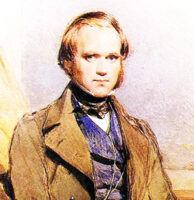
“Thus, disbelief crept over me at a very slow rate, but at least it was complete. The rate was so slow that I felt no distress and have never since doubted even for a single second that my conclusion was correct. I can hardly see how anyone ought to wish Christianity to be true, for if so, the plain language of the text seems to show that the men who do not believe, and this would include my Father, Brother, and almost all my best friends, will be everlasting punishment. This is a damnable doctrine.”
Logical Explanation
Natural selection gave Darwin a logical explanation for the natural formation of Earth’s biosphere. In the Descent of Man (1871), Darwin explains the risks and reasons –
“If I have erred in giving to natural selection great power, which I am very far from admitting, or in having exaggerated its power, which is in itself probable, I have at least, as I hope, done good service in aiding to overthrow the dogma of separate creation.”
The influence of the Enlightenment movement popularized exploring evolution beyond the sphere of science.
Evolution “In the Air”
The Origin of Species was an immediate success; all 1,250 printed copies of the book sold out on the first day, with 3,800 copies sold during its first year of publication. As Darwin noted –
“[It] has sometimes been said that the success of the Origin proved ‘that the subject was in the air… ‘men’s minds were prepared for it.'”
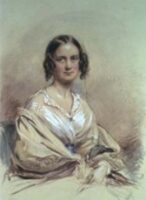 Since Darwin’s wife, Emma (pictured left), was far from declaring Christianity a “damnable doctrine,” he assured her that his work was a “considerable step in science.” Yet, he never stated or implied The Origin of Species anything other than “one long argument.”
Since Darwin’s wife, Emma (pictured left), was far from declaring Christianity a “damnable doctrine,” he assured her that his work was a “considerable step in science.” Yet, he never stated or implied The Origin of Species anything other than “one long argument.”
Darwin was transparent with his colleagues about the role of science in his work. In the year before publication in 1859, Darwin explained to American naturalist Asa Gray (pictured right), author of Gray’s Anatomy, that his novel approach did not correspond to the principles of 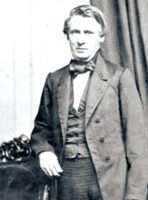 science –
science –
“I am quite conscious that my speculations run quite beyond the bounds of true science.”
While The Origin of Species included one diagram, Darwin’s never defined his terms nor included any tables or graphs with any objective observations, the “facts.” As a result, none of Darwin’s publications are suitable for any academic science class instruction.
Even though emerging as a global phenomenon, The Royal Society never awarded Darwin a Royal Medal for any of his later works since his approach was not scientific.
New Approach, Old Audience
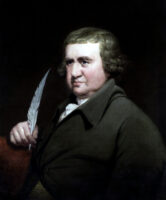 Darwin’s logical approach resonated with his grandfather’s audience. Erasmus Darwin (pictured left) was a leading influencer, even declining a Physician to the King request from George III.
Darwin’s logical approach resonated with his grandfather’s audience. Erasmus Darwin (pictured left) was a leading influencer, even declining a Physician to the King request from George III.
Erasmus developed animal classifications, organic laws, and disease classifications. His two volumes of Zoonomia (1794–1796) attracted Enlightenment’s progressive audience with his “improvements by generation” concepts –
“Would it be too bold to imagine that in the great length of time, since the earth began to exist, perhaps millions of ages before the commencement of the history of mankind, would it be too bold to imagine that all warm-blooded animals have arisen from one living filament… delivering down those improvements by generation to its posterity, world without end!”
The Darwin family were intellectual legends. While studying at Edinburgh, Darwin drew the attention of Professor Robert Edmund Grant. In Grant’s doctoral thesis, he quoted from Zoonomia. Not surprisingly, Darwin became Grant’s keenest student.
However, Darwin was an independent intellectual. While he mirrored his grandfather’s progressive approach, Darwin never credited Erasmus’ concepts in The Origen of Species. Erasmus based his theories on David Hartley‘s psychological theory of associationism.
The Enlightenment movement, rooted in rationalism‘s view that the universe is an intrinsically logical system drove progressive naturalist’s approach to logic.
Rene Descartes
 Coining the Latin phrase in Discourse on Method, “Cogito, ergo sum” (“I think; therefore, I am”), René Descartes (1596-1650) of Touraine, France, developed the intellectual foundations of the Enlightenment movement, including a return to the deductive reasoning process to resolve nature’s persistent mysteries.
Coining the Latin phrase in Discourse on Method, “Cogito, ergo sum” (“I think; therefore, I am”), René Descartes (1596-1650) of Touraine, France, developed the intellectual foundations of the Enlightenment movement, including a return to the deductive reasoning process to resolve nature’s persistent mysteries.
Descartes (pictured left) is now known as the father of modern philosophy and algebraic geometry. His approach profoundly influenced Modern Western thought, giving rise to the Enlightenment’s new philosophical system, reminiscent of Aristotle’s. Known as Cartesianism, Descartes erroneously argued that all knowledge would emerge through deductive reasoning.
In the decades before The Origin of Species, Descartes’s deductive approach continued to gain popularity, including Darwin, challenging the scientific principles developed by Bacon. His letter to Henry Fawcett, an Enlightenment statesman, economist, and colleague, argues for the deductive approach –
“About 30 years ago, there was much talk that Geologists ought only to observe & not theorize; & I well remember someone saying, that at this rate a man might as well go into a gravel-pit & count the pebbles & describe their colours. How odd it is that everyone should not see that all observation must be for or against some view if it is to be of any service.”
Descartes Challenges Bacon
The popularity of Descartes’s deductive approach challenged Bacon’s scientific method. Descartes argued that all truth is discoverable using human reasoning. Bacon, however, argued truth must be discoverable independent of reasoning.
Given the scope of unsolved mysteries, intellectuals and Enlightenment scientists increasingly resonated with Descartes’s deductive approach, including John Locke (1632-1704) and David Hume (1711-1776). WIKIPEDIA notes –
“In an anthropocentric revolution, the human being is now raised to the level of a subject, an agent, an emancipated being equipped with autonomous reason… This anthropocentric perspective of Descartes’s work, establishing human reason as autonomous, provided the basis for the Enlightenment’s emancipation from God and the Church.”
Voltaire
 The philosophical tale in The History of the Decline and Fall of the Roman Empire (1776), written by François-Marie Arouet (1694-1778), best known as Voltaire (pictured left), commented on, criticized, and ridiculed events, thinkers, popular philosophies, and religions of the time. As a deist, Voltaire argued –
The philosophical tale in The History of the Decline and Fall of the Roman Empire (1776), written by François-Marie Arouet (1694-1778), best known as Voltaire (pictured left), commented on, criticized, and ridiculed events, thinkers, popular philosophies, and religions of the time. As a deist, Voltaire argued –
“As Christianity advances, disasters befall the [Roman] empire—arts, science, literature, decay—barbarism, and all its revolting concomitants.”
In France, Paris merged as the center of the Enlightenment movement, challenging traditional doctrines and dogmas. Tragically, the movement sparked the French Revolution and the Reign of Terror, resulting in over 16,600 executed in Paris and providences over two years.
Immanuel Kant
To understand the origin of life, deductive reasoning replaced inductive reasoning. By adopting the premise that the universe must be intrinsically logical excluding non-logical explanations, including the Genesis account. Philosopher Immanuel Kant, using this approach in his Critique of Judgement (1792), reasoned –
“A daring venture of reason… [in which] one organic being [is] derived from another organic being, although from one which is specifically different, e.g., certain water-animals transform themselves gradually into marsh-animals and from these, after some generations, into land-animals.”
Charles Darwin
Evolution emerged as a cardinal ideology of the Enlightenment movement–a natural explanation for the origin of life. By the mid-nineteenth century, the movement’s influence gained traction amongst the intellectual elite. Darwin turned to evolution since the biblical explanation was increasingly unpopular.
The Origin of Species was “one long argument,” Darwin explained, “from the beginning to the end” – music to Descartes: treason to Bacon. While the book includes one diagram, no objective measurable “fact” appears anywhere 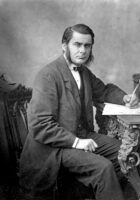 in the voluminous texts.
in the voluminous texts.
Although a history of science legend, the book’s vagueness violates the principles of science. As Thomas Huxley, “Darwin’s Bulldog,” explains –
“[it] Is one of the hardest books to understand thoroughly that I know of.”
The Royal Society, nor any other science organization, awarded a medal to Darwin for The Origin of Species. However, the American Philosophical Society awarded Darwin an honorary membership in 1869.
Natural Selection Deductive Logic
As a logical construct, natural selection has emerged as one of the longest-running controversial theories in the history of the natural sciences.
Jerry Fodor and Massimo Piattelli-Palmarini
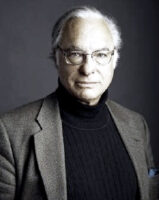 Natural selection exemplifies what happens to a theory founded “beyond the bounds of science.” Even evolution scientists remain critical. Evolution scientists Jerry Fodor of Columbia University and Massimo Piattelli-Palmarini (pictured left) of the University of Arizona, in What Darwin Got Wrong, explain –
Natural selection exemplifies what happens to a theory founded “beyond the bounds of science.” Even evolution scientists remain critical. Evolution scientists Jerry Fodor of Columbia University and Massimo Piattelli-Palmarini (pictured left) of the University of Arizona, in What Darwin Got Wrong, explain –
“We have both spent effort and ink… to show that Darwin’s theory of natural selection is fatally flawed.”
Jerry Coyne
The critical views of Fodor and Piattelli-Palmarini have since gained broad acceptance. Even in the words of powerhouse evolution advocate Jerry Coyne of the University of Chicago –
“We must stop pretending we understand the course of natural selection.”
Niles Eldredge
Niles Eldredge (pictured right), an American biologist, and paleontologist of the American Museum of Natural History, a long-time collaborator with legendary evolution advocate Stephen Jay Gould, contends –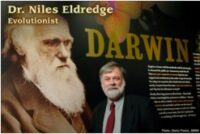
“In the literal sense of the word, no doubt, natural selection is a false term.”
In natural selection’s truth or consequence moment, not a single scientific organization has developed a scientific consensus on natural selection in the twenty-first century; despite repeated attempts.
Darwin, a Scientist?
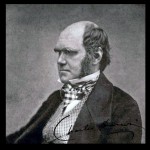 Early in his career, The Royal Society awarded Darwin with a Royal Medal in 1853 for his contributions to geology (1846) and paleontology (1851).
Early in his career, The Royal Society awarded Darwin with a Royal Medal in 1853 for his contributions to geology (1846) and paleontology (1851).
By blending in logical deductive reasoning, Darwin argued in The Origin of Species that natural selection was the “means” accounting for life. However, his work on natural selection never gained recognition by any scientific organization, including The Royal Society.
Natural selection is a blended science and logic concept yet to be scientifically validated.
Genesis
Empirical scientific evidence, not necessarily logic, is always compatible with the Genesis account written by Moses. 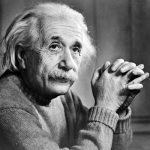
In the words of Albert Einstein, a German-born theoretical physicist born in Germany, 1879-1955, Physicist Developed the general theory of relativity, one of the two pillars of modern physics, and is best known in popular culture for his mass-energy equivalence formula E = mc2 – dubbed “the world’s most famous equation” –
“Everyone who is seriously engaged in the pursuit of science becomes convinced that the laws of nature manifest the existence of a spirit vastly superior to that of man, and one in the face of which we with our modest powers must feel humble.”
Darwin’s theory of natural selection emerged through a blending of logic and scientific approaches—its status as a natural law remains to be validated scientifically.
Logic and Science is a Theory and Consensus article.
Darwin Then and Now is an educational resource on the intersection of evolution and science, highlighting the ongoing challenges to the theory of evolution.
Move On
Explore how to understand twenty-first-century concepts of evolution further using the following links –
-
- The Understanding Evolution category showcases how varying historical study approaches to evolution have led to varying conclusions. Subcategories include –
- Studying Evolution explains how key evolution terms and concepts have changed since the 1958 publication of The Origin of Species.
- What is Science explains Charles Darwin’s approach to science and how modern science approaches can be applied for different investigative purposes.
- Evolution and Science feature study articles on how scientific evidence influences the current understanding of evolution.
- Theory and Consensus feature articles on the historical timelines of the theory and Natural Selection.
- The Biography of Charles Darwin category showcases relevant aspects of his life.
- The Glossary defines terms used in studying the theory of biological evolution.
- The Understanding Evolution category showcases how varying historical study approaches to evolution have led to varying conclusions. Subcategories include –


